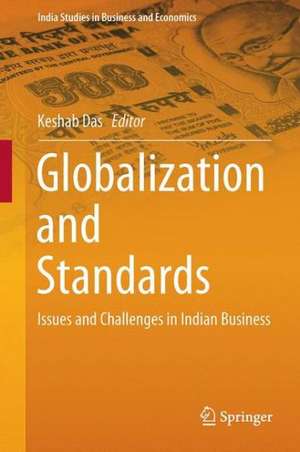Globalization and Standards: Issues and Challenges in Indian Business: India Studies in Business and Economics
Editat de Keshab Dasen Limba Engleză Hardback – 14 oct 2014
We have limited knowledge about the challenges faced and strategies pursued by these key domestic actors, both public and private. How have they been able to drive these processes and what are their implications for larger concerns with inequalities and the conditions of the poor? How does the omnipresent informality influence compliance, encourage multiple standards and affect the chances of addressing institutional dysfunctionality? What role does regulation play? These are some of the issues dealt with in the book, which has chapters focusing on aspects of specific sectors such as microfinance, pharmaceuticals, automobiles, tea trading, the role of the state and changing consumer influence.
We have limited knowledge about the challenges faced andstrategies pursued by these key domestic actors, both public and private. How have been they able to drive these processes and what are the consequences of these changes for the Indian economy, other emergent economies and for the rest of the developing world? In particular, what are their implications for the wider Indian society, especially on concerns with informality, inequalities and the conditions of the poor? How does informality in its omnipresent form influence compliance, encourage multiple standards and chances of addressing institutional dysfunctionality? What role does regulation play? These are some of the issues dealt within the book wherein chapters focus on aspects of specific sectors, trading, role of the state and changing influence of the consumer.
| Toate formatele și edițiile | Preț | Express |
|---|---|---|
| Paperback (1) | 562.30 lei 38-44 zile | |
| Springer India – 10 sep 2016 | 562.30 lei 38-44 zile | |
| Hardback (1) | 573.21 lei 38-44 zile | |
| Springer India – 14 oct 2014 | 573.21 lei 38-44 zile |
Din seria India Studies in Business and Economics
- 18%
 Preț: 897.65 lei
Preț: 897.65 lei -
 Preț: 361.78 lei
Preț: 361.78 lei - 18%
 Preț: 1006.24 lei
Preț: 1006.24 lei - 18%
 Preț: 952.89 lei
Preț: 952.89 lei - 20%
 Preț: 883.22 lei
Preț: 883.22 lei -
 Preț: 186.41 lei
Preț: 186.41 lei - 15%
 Preț: 636.94 lei
Preț: 636.94 lei - 15%
 Preț: 647.27 lei
Preț: 647.27 lei - 15%
 Preț: 646.30 lei
Preț: 646.30 lei -
 Preț: 409.89 lei
Preț: 409.89 lei -
 Preț: 372.98 lei
Preț: 372.98 lei -
 Preț: 389.88 lei
Preț: 389.88 lei - 18%
 Preț: 894.03 lei
Preț: 894.03 lei - 15%
 Preț: 644.30 lei
Preț: 644.30 lei - 15%
 Preț: 528.30 lei
Preț: 528.30 lei - 15%
 Preț: 643.65 lei
Preț: 643.65 lei - 15%
 Preț: 644.82 lei
Preț: 644.82 lei - 15%
 Preț: 660.37 lei
Preț: 660.37 lei -
 Preț: 386.00 lei
Preț: 386.00 lei - 20%
 Preț: 559.76 lei
Preț: 559.76 lei - 15%
 Preț: 643.99 lei
Preț: 643.99 lei -
 Preț: 386.68 lei
Preț: 386.68 lei -
 Preț: 390.08 lei
Preț: 390.08 lei -
 Preț: 365.76 lei
Preț: 365.76 lei -
 Preț: 393.52 lei
Preț: 393.52 lei - 15%
 Preț: 656.74 lei
Preț: 656.74 lei - 24%
 Preț: 699.24 lei
Preț: 699.24 lei -
 Preț: 369.80 lei
Preț: 369.80 lei - 15%
 Preț: 642.68 lei
Preț: 642.68 lei -
 Preț: 388.90 lei
Preț: 388.90 lei - 15%
 Preț: 649.87 lei
Preț: 649.87 lei - 15%
 Preț: 645.28 lei
Preț: 645.28 lei -
 Preț: 372.66 lei
Preț: 372.66 lei -
 Preț: 389.17 lei
Preț: 389.17 lei - 20%
 Preț: 569.00 lei
Preț: 569.00 lei - 15%
 Preț: 641.85 lei
Preț: 641.85 lei -
 Preț: 392.97 lei
Preț: 392.97 lei - 15%
 Preț: 643.84 lei
Preț: 643.84 lei - 24%
 Preț: 656.32 lei
Preț: 656.32 lei - 15%
 Preț: 651.34 lei
Preț: 651.34 lei - 15%
 Preț: 641.53 lei
Preț: 641.53 lei - 15%
 Preț: 640.37 lei
Preț: 640.37 lei - 20%
 Preț: 569.86 lei
Preț: 569.86 lei
Preț: 573.21 lei
Preț vechi: 716.51 lei
-20% Nou
Puncte Express: 860
Preț estimativ în valută:
109.68€ • 114.53$ • 90.57£
109.68€ • 114.53$ • 90.57£
Carte tipărită la comandă
Livrare economică 11-17 aprilie
Preluare comenzi: 021 569.72.76
Specificații
ISBN-13: 9788132219934
ISBN-10: 8132219937
Pagini: 316
Ilustrații: XV, 300 p. 15 illus., 9 illus. in color.
Dimensiuni: 155 x 235 x 23 mm
Greutate: 0.62 kg
Ediția:2014
Editura: Springer India
Colecția Springer
Seria India Studies in Business and Economics
Locul publicării:New Delhi, India
ISBN-10: 8132219937
Pagini: 316
Ilustrații: XV, 300 p. 15 illus., 9 illus. in color.
Dimensiuni: 155 x 235 x 23 mm
Greutate: 0.62 kg
Ediția:2014
Editura: Springer India
Colecția Springer
Seria India Studies in Business and Economics
Locul publicării:New Delhi, India
Public țintă
ResearchCuprins
Globalization and Standards: Concerns in a Large Transforming Economy, India.- Standards and Consumer Behaviour of the Rising Middle Class in India.- Impact of the Retail FDI Policy on Indian Consumers and the Way Forward.- Environmentally Sensitive Goods in India’s Trade: Emerging Challenges and Prospects.- Indian Microfinance and Codes of Conduct Regulation: A Critical Examination.- Automotive Industry Response to Its Global QMS Standard ISO/TS-16949.- Regulatory Standards in Pharmaceuticals and Consumers: Missing Links.- Medical Consumption and Clinical Practice: India at the Crossroads.- From Reverse Engineering to Reverse Innovation: GPNs and the Emerging Powers.- Institutions and Innovation: A Study of ICT-MSMEs in India.- Promoting Cluster Development Through Decent Work: Case of the Surat Diamond Processing Cluster.- Regulating Industrialization through Public Action and Legal Intervention: Interpreting an On-going Experiment in Tamil Nadu.- Small Industry in India: Are CETPs an Appropriate Response towards Pollution Control?.- Has the Indian Tea Plantation Industry Weathered the Crisis during Reforms?.- India's Organic Guarantee System: Novelty or Facsimile?.
Notă biografică
Keshab Das is a Professor and Acting Director at the Gujarat Institute of Development Research, Ahmedabad, India. He received his M.Phil. in Applied Economics and Ph.D. in Economics from the Jawaharlal Nehru University, New Delhi, through the Centre for Development Studies, Trivandrum. He received the VKRV Rao Prize in Social Sciences (Economics) in 2004. He has been a visiting researcher at the International Institute of Social Studies (ISS), The Hague, The Netherlands; Institute for Development Policy and Management (IDPM), University of Manchester, UK; University of Insubria, Varese, Italy; Institute of Developing Economies, Chiba, Japan; Maison des Sciences de l'Homme (MSH), Paris; and Institute of Development Studies at the University of Sussex, UK. He was twice invited as a CNRS visiting faculty at Recherches en Economie, Geographie et Anthropologie sur les Recompositions et le Developpement des Suds (REGARDS), Bordeaux, France.
Prof. Das has authored/edited manybooks including Small and Medium Enterprise (SME) Competitiveness: Issues and Initiatives (Gujarat Industrial Development Corporation, Gandhinagar, 2011); Micro and Small Enterprises in India: The Era of Reforms (Routledge, New Delhi, 2011. Edited.); Policy and Status Paper on Cluster Development in India (Foundation for MSME Clusters, New Delhi, 2007. Co-authored.); Indian Industrial Clusters (Ashgate, Aldershot, UK, 2005. Edited.); The Growth and Transformation of Small Firms in India (Oxford University Press, New Delhi, 2001. Co-authored.); and Peasant Economy and the Sugar Cooperative: a Study of the Aska Region in Orissa (CDS, Trivandrum, 1993). With about eighty published research papers, his research concerns issues in regional development, industrialization, small firm development, industrial clusters, informal sector, labour and basic infrastructure in both rural and urban areas.
Prof. Das has authored/edited manybooks including Small and Medium Enterprise (SME) Competitiveness: Issues and Initiatives (Gujarat Industrial Development Corporation, Gandhinagar, 2011); Micro and Small Enterprises in India: The Era of Reforms (Routledge, New Delhi, 2011. Edited.); Policy and Status Paper on Cluster Development in India (Foundation for MSME Clusters, New Delhi, 2007. Co-authored.); Indian Industrial Clusters (Ashgate, Aldershot, UK, 2005. Edited.); The Growth and Transformation of Small Firms in India (Oxford University Press, New Delhi, 2001. Co-authored.); and Peasant Economy and the Sugar Cooperative: a Study of the Aska Region in Orissa (CDS, Trivandrum, 1993). With about eighty published research papers, his research concerns issues in regional development, industrialization, small firm development, industrial clusters, informal sector, labour and basic infrastructure in both rural and urban areas.
Textul de pe ultima copertă
The changes following more than two decades of economic reforms and globalization of the Indian economy – at state, corporate sector, and consumer level – raise interesting questions on the ways in which the stakeholders will continue to engage on the world stage, politically, socially and economically. One key feature of global trade over this period has been the growing importance of not only product standards but, importantly, labor, environmental, food safety and social standards. Being essentially a non-tariff barrier,standards have often become critical to market access and essential to sustained competitiveness. This has a clear impact on the manner in which both global and Indian business is conducted now and in the future. It also underlines the need for a new area of enquiry that addresses the following questions: How are the Indian public and private actors – the state, domestic firms, local consumers and society – influencing and being influenced by such standards? Do standards really matter in an overwhelmingly informal production sphere, with consumers deeply segmented on the basis of a highly skewed distribution of income and with the rural population becoming further marginalized?
We have limited knowledge about the challenges faced and strategies pursued by these key domestic actors, both public and private. How have they been able to drive these processes and what are their implications for larger concerns with inequalities and the conditions of the poor? How does the omnipresent informality influence compliance, encourage multiple standards and affect the chances of addressing institutional dysfunctionality? What role does regulation play? These are some of the issues dealt with in the book, which has chapters focusing on aspects of specific sectors such as microfinance, pharmaceuticals, automobiles, tea trading, the role of the state and changing consumer influence.
We have limited knowledge about the challenges faced and strategies pursued by these key domestic actors, both public and private. How have they been able to drive these processes and what are their implications for larger concerns with inequalities and the conditions of the poor? How does the omnipresent informality influence compliance, encourage multiple standards and affect the chances of addressing institutional dysfunctionality? What role does regulation play? These are some of the issues dealt with in the book, which has chapters focusing on aspects of specific sectors such as microfinance, pharmaceuticals, automobiles, tea trading, the role of the state and changing consumer influence.
Caracteristici
Examines the basis and agency of standards - product and process related – and deals with informality, inequality and role of institutions Discusses aspects of trade, regulation and compliance along with concerns for such issues as labour conditions, incentives for innovation and environmental pollution Highlights, with sub-sectoral focus, functional complexities of domestic and global standards within an imperfect institutional framework and a segmented consumer base Includes supplementary material: sn.pub/extras
















